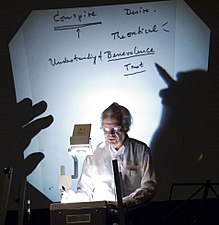Otto E. Roessler
Otto E. Rössler (born May 20, 1940 in Berlin ) is a German biochemist and chaos researcher .
Life and work
Otto Eberhard Rössler grew up as the son of the Semitic Studies professor Otto Rössler in Tübingen and passed the (old language) Abitur there. After studying medicine at the Eberhard Karls University in Tübingen , he was awarded a Dr. med. PhD . 1967-68 he received a post-doctoral position at the Max Planck Institute for Behavioral Physiology in Seewiesen (Pöcking) with Konrad Lorenz . In 1969 he was visiting professor at the Center for Theoretical Biology at New York State University in Buffalo , 1970 lecturer and from 1977Professor at the Institute for Physical and Theoretical Chemistry at the University of Tübingen. In 1981 he accepted a visiting professorship in mathematics at Guelph University in Canada and in 1983 a visiting professorship at the Center for Nonlinear Studies of the University of California at Los Alamos National Laboratory .
Rössler is one of the pioneers in chaos research . The Rössler attractor is named after him. In addition, he also deals with endophysics .
Since 1988 he has been involved - together with his wife - in a profound discussion with the University of Tübingen and its supervisory authority, the Baden-Württemberg Ministry for Science, Research and Art in Stuttgart , in particular about the scope and content of the respective academic teaching obligations; Among other things, there were also convictions for trespassing and property damage.
Rössler has also become known as an opponent of the Large Hadron Collider (LHC) , a particle accelerator built at CERN and launched in 2009 : He advocates the thesis that artificial black holes can be created during operation of the LHC and that one of these extremely small black holes cannot - as Stephen did Hawking suspects - it could decay into radiation again immediately, but instead show exponential growth until it would ultimately devour the entire mass of the earth. Rössler relies on his understanding of the known properties of black holes, especially those of the event horizon . If this is exceeded by a particle, an escape becomes impossible. Rössler's thesis and its underlying understanding of general relativity is rejected by a large majority of scientists.
A group around Rössler filed a lawsuit against the commissioning of the LHC at the European Court of Human Rights . The related urgent application was rejected by the court in August 2008. The German Federal Constitutional Court refused to accept a constitutional complaint in February 2010 due to a lack of fundamental significance and a lack of prospect of success. Other lawsuits also failed.
In 2007, Rössler was elected a member of the learned society Leibniz Society of Sciences in Berlin . He is married to the endocrinologist Reimara Rössler .
Publications
- Existence of a “building block principle” when designing complex reaction systems. Habil. Tübingen 1972
- with Jürgen Parisi, Joachim Peinke and Ruedi Stoop: Encounter with Chaos. Self-Organized Hierarchical Complexity in Semiconductor Experiments. Springer, Berlin 1992, ISBN 3-540-55647-8
- Endophysics. The world of the inner observer. Merve, Berlin 1992, ISBN 3-88396-085-3
- (with Reimara Rössler): Jonas' world. A Child's Thinking , 1994, ISBN 3-499-19710-3
- The flaming sword or how hermetic is the interface of micro-constructivism? Benteli, Bern 1996, ISBN 3-7165-1017-3
- with René Stettler: Interventions. Vertical and horizontal border crossing. Stroemfeld, Basel and Frankfurt 1997, ISBN 3-87877-627-6
- with Peter Weibel : outer world - inner world - overworld. A conversation. Stroemfeld, Basel / Frankfurt 1997, ISBN 3-87877-628-4
- with Wilfried Kriese: Courage to Lampsacus. The internet as an opportunity. Mauer Verlag, Rottenburg 1998
- with Artur P. Schmidt : Medium of Knowledge. The human right to information. Haupt, Bern 2000 ( PDF ; 1.61 MB)
- Descartes' dream. From the infinite power of standing outside. Audio CD. Supposé, Cologne 2002, ISBN 3-932513-28-2
- Stefan Bombaci (text on the exhibition catalog). Württembergischer Kunstverein, Stuttgart 2004, ISBN 3-930693-23-2
- with Bill Seaman: Neosentience. The benevolence engine , 2011, ISBN 978-1-84150-404-9
- with Ali Sanayei: Chaotic harmony. a dialog about physics, complexity and life , 2014, ISBN 978-3-319-06780-3
Web links
- Literature by and about Otto E. Rössler in the catalog of the German National Library
- Interview: Chaos, Conspiracy, Black Holes , February 8, 2008, golem.de
Individual evidence
- ↑ Jochen Leffers: Tübingen permanent feud - the chaos researcher and the windmill wings. Report in SPIEGEL on August 29, 2001.
- ↑ A victim of the university: . Retrieved October 17, 2008.
- ↑ Gregory Patorski: "Largest crimes of humanity." At: 20min.ch. ( 20 minutes ), June 26, 2008 (with interview)
- ↑ Adventure Knowledge ( ZDF ): Black holes in the laboratory? Controversy about possible danger from experiments at the LHC. ( Memento of September 3, 2014 in the Internet Archive ) June 4, 2008 (with further links).
- ^ Opinion on the assertions of Prof. Rössler. (PDF; 80 kB), Committee for Elementary Particle Physics (KET)
- ↑ Holger Dambeck: court rejects urgent application against super accelerator. In: Spiegel Online. Retrieved August 23, 2011 .
- ↑ Federal Constitutional Court : BVerfG rejects measures against super accelerators. 2 BvR 2502/08 of January 18, 2010, accessed on July 31, 2013.
- ↑ Fear of the end of the world: the lawsuit against Cern finally failed. On: spiegel.de. Retrieved February 16, 2014.
- ↑ The book uses recorded statements by Rössler's son Jonas (* 1983; † December 27, 1990 after a traffic accident) to trace his development, see article at ZEIT-Online
| personal data | |
|---|---|
| SURNAME | Rössler, Otto E. |
| ALTERNATIVE NAMES | Rössler, Otto Eberhard |
| BRIEF DESCRIPTION | German biochemist and chaos researcher |
| DATE OF BIRTH | May 20, 1940 |
| PLACE OF BIRTH | Berlin |

